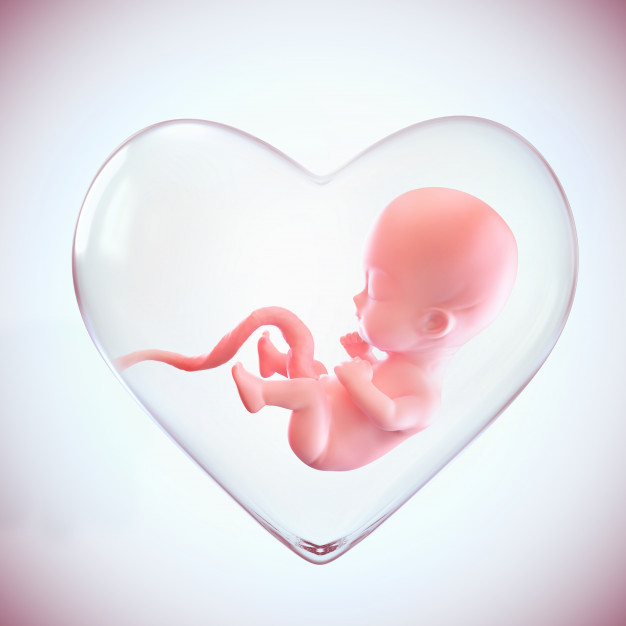
From the moment a woman finds out about pregnancy, it is necessary to approach her health with utmost responsibility, listen carefully to the body and actively prepare for the upcoming birth. It is also important to understand what exactly happens inside the uterus, how the first weeks after conception pass, how the fetus develops in the second and third trimesters, how the body prepares for labor in the later stages. We will try to answer all these questions in this article.
First trimester of pregnancy
If you are planning a pregnancy, then the latter can occur in any month of active attempts. And since the first week will not manifest itself symptomatically in any way, then you should approach your health responsibly even at the planning stage. First, give up all bad habits: drinking alcohol, smoking tobacco and hookah, taking illegal substances, etc. Also try to keep the wakefulness and rest regime, be sure to get enough sleep. The diet should be dominated by vitamin products (vegetables, fruits, berries), dairy and fermented milk products, lean meat. At the planning stage, have all your teeth cured by the dentist, as their condition can deteriorate rapidly during pregnancy, but there will be no possibility of using anesthesia.
First trimester weeks
2nd week
Conception can be considered in the second week of pregnancy. So, the largest and healthiest egg with nutrients leaves the ovary and goes through the fallopian tube, where the sperm is waiting for it. At the place where the egg came off, a yellow body (corpus luteum) appears, and if in the future fertilization is successful, and the zygote attaches to the uterus, then as a result of the production of hormones by the yellow body, a feeling of dizziness, drowsiness, and nausea arises. In the second week, it is important to maintain a normal vaginal pH – stop douching, do not put any gynecological suppositories. Wash with a special product for intimate hygiene, herbal decoctions or baby soap.
3rd week
The ovum passes through the fallopian tube, where it is fertilized by a sperm. As a result of conception, a zygote is formed, and this moment can be considered as the creation of a fetus. The egg moves along the fallopian tube and get fixed on the wall of the uterus, the corpus luteum produces progesterone, which supplies the zygote with the necessary nutrients. In the third week, women who listen carefully to their bodies may notice the first signs of pregnancy: mild pelvic cramping, the nipples swell and become sensitive.
4th week
The woman experiences slight malaise, lethargy and drowsiness – the body is actively rebuilding itself to carry the fetus. Brown discharge may appear from the vagina. Also, some women note a pulling or aching pain in the lower abdomen. If all of the above symptoms are present, it is advisable to consult a gynecologist to exclude an ectopic pregnancy. At the fourth week, the division of cells of the zygote continues, its second layer is formed, which acts as a kind of barrier against negative factors.
5th week
During this period, pregnant women may notice toxicosis: nausea and sometimes even vomiting in the morning, intolerance to certain odors, changes in taste and food preferences. This period is accompanied by a radical restructuring of the hormonal status, which can be accompanied by mood swings, increased nervousness and anxiety, sluggishness and drowsiness. The embryo, on the fifth week, gradually forms into the fetus, in which a neural tube develops, and from it, in turn, the primary nervous system and spine. The first contraction of the fetal heart muscle also occurs at this time. The digestive tract organs are laid.
6th week
The toxicosis continues to grow, demand of good rest is noticeable. Many pregnant women report dehydration and increased fluid intake. During this period, body weight may slightly decrease. The development of the internal organs of the fetus continues.
7th week
The corpus luteum, which produced pregnancy hormones, disappears – the function is responsibly transferred to the placenta. During this period, the threat of miscarriage increases, therefore, women who have pathologies of the hormonal and endocrine systems need to be especially attentive to their health. It is also necessary to beware of pregnant women who have different rhesus blood with their husbands. As for the fetus, on ultrasound, it gradually straightens to its full height, which is up to 1 cm. Brain cells are gradually formed, the stomach and lungs develop. Toxicosis in a pregnant woman may increase.
8th week
The dangerous gestation period is coming to an end. Pregnant women report strange taste preferences such as gnawing on crayons, drinking salt water, eating herring with cake, etc. Doctors recommend eating small meals up to 7 times a day. A woman’s uterus gradually enlarges along with the mammary glands. In a child, taste and smell receptors are laid. In the eighth week, you can try to determine the sex of the child.
9th week
The appearance of the pregnant woman changes slightly; veins appear more, the breast swells greatly. On ultrasound, you can see the first movements of the fetus. He also ends the development of the convolutions of the brain.
10th week
The uterus continues to grow actively. Symptoms of toxicosis become less, weight begins to increase rapidly. The growing uterus presses on the bladder, causing the urge to use the toilet. The child grows up to 4 cm.
11th week
During this period, the risk of pregnancy diabetes increases – control the consumption of sweets. As a result of the accelerated metabolism, heat can be felt, nails and hair grow stronger. The iris of the eyes is laid in the embryo, the excretory system and its own metabolism are formed.
12th week
Pregnant women may experience digestive problems, in particular constipation. Also, during this period, the abdomen continues to grow, which affects posture, loads the lower back. Ultrasound diagnoses the presence or absence of Down syndrome in the child.

Pregnancy in the second trimester
13th week
Digestive problems can continue: bloating, flatulence, constipation, etc. In the fetus, the rudiments of milk teeth are laid, the intestines of the child during this period are already able to assimilate food.
14th week
The health of a pregnant woman is getting a little better, but it is harder to move around – her legs and lower back swell and get tired quickly. The urine of the child is excreted in the amniotic fluid.
15th week
The mom-to-be notices a dark hormonal streak that stretches from the navel to the pubis – it will disappear after a while after giving birth. The ultrasound is already suggesting a probable date of birth. Constipation problems are replaced by high blood pressure. The fetus can clench its fists, begins to move more actively in the uterus.
16th week
The active development of the fetus continues, it gains mass and increases its growth.
17th week
The load on the heart muscle of the pregnant woman increases, but the uterus ceases to squeeze the internal organs. The fetus is about 16 cm long.It also develops its own immunity.
18th week
A woman gains an average of 0.5 kg per week. There may be severe swelling, sodium deficiency, which leads to a problem with fluid outflow. The child’s features are already determined, he is able to hear sounds.
19th week
With an enlargement of uterus, pulling pain in the lower back is increasingly noted. The body gradually prepares for childbirth by relaxing the joints. The fetus develops the central nervous system with the brain, stomach.
20th week
The fetus can actively kick, causing a little discomfort to the mother. The growing uterus presses on the lungs, causing shortness of breath. During this period, false contractions sometimes occur, and mucus may be released from the vagina.
21th week
An expectant mother may complain of heartburn, so a special diet will not hurt. The fetus begins to gradually store fat.
22th week
The pregnant notes severe swelling of the face and neck, extremities. At the same time, the skin becomes healthier, firmer and younger, the hairline thickens. The child has eyebrows, the weight can reach 0.5 kilos, and the height is up to 25 cm.
23th week
The uterus grows and expands, stretching the skin and leading to mild itching. Colostrum may be released from the nipples. The bones of the sacrum gradually soften, which leads to a change of the usual gait. Numbness and tingling of the extremities may occur as a result of edema. The child develops a sucking reflex.
24th week
Already during this period, Braxton Hicks (normal everyday contractions) or even real contractions may appear (the main thing is not to get nervous and avoid psychologically and physically stressful situations). The fetus begins to produce growth hormone.

Weeks of the third trimester
25th week
The pregnant woman notices pink skin on the abdomen – the uterus continues to expand at the sides. The weight of the fetus reaches 0.7 kg, and the height is more than 20 cm. The heartbeat is heard if you put your ear to your stomach.
26th week
The child continues to actively develop the central nervous system and brain.
27th week and 28th week
The placenta begins to produce progesterone, which contributes to the normal course of pregnancy.
29th week
It becomes difficult for a pregnant woman to walk and perform even basic physical exercises. The baby is actively growing, it becomes cramped in his tummy, so the movements are reduced.
30th week
During this period, pressure drops begin to be noted. The baby gradually turns in the tummy to the natural position, head down.
31th week
The woman practically does not gain weight, but the edema, unfortunately, does not go anywhere, since it is difficult for the kidneys to cope with the increased load. The fetus had already formed by this time.
32th week
It’s time to sign up for an ultrasound scan for a control check. The child is gaining weight up to 2 kilograms, and growth up to 40 cm.
33th week
The expectant mother notes the frequent urge to use the toilet. It is better to cut down on drinking, making it easier for the kidneys.
34th week
False contractions may appear again. However, if the water flows away, then you must immediately go to the hospital.
35th week
The pregnant woman still complains of insomnia, since late sleep is really uncomfortable. During this period, the diet should include foods with sodium and calcium. It’s time to pack the bag to the hospital so that it is always ready.
36th week
On average, by this period, the weight gain of the expectant mother during pregnancy reaches 12 kg. It is necessary to refrain from intimate relationships, as they can provoke labor ahead of time. The baby’s weight reaches 2.5 kg, and the height is about 45-47 cm.
37th week
Labor activity can begin any day. The mammary glands are fully developed and are no longer compressing the breast. Colostrum can be actively secreted from the nipples.
38th week
At this point, the pregnancy is considered full-term. The fetus is ready to be born, it turns over less often. The fewer movements the baby makes, the closer the day of birth. Gradually, discomfort appears in the lower abdomen – pulling pain.
39th week
The baby’s head passes into the birth canal, so the stomach can visually drop down a little. The child’s weight is approaching 3 kg, and the height is 52 cm.
40th week
It’s time for the baby to be born, so be ready to go to the hospital at any time. Excessive discharge of mucus from the vagina is also a harbinger of imminent labor.
Pregnancy after 40th week

41th week
It is necessary to understand that the extension of pregnancy by two weeks, according to medical standards, can be considered normal, which is associated with the individual characteristics of the organism. Don’t worry – just wait.
42th week
According to statistics, only 10% of pregnant women give birth at this time. Doctors advise to massage the mammary glands to stimulate the production of oxytocin, a hormone that stimulates uterine contraction.
43th week
It is advisable for a pregnant to go to the hospital, since the baby’s stomach begins to work independently, digesting food and excreting feces – meconium. The latter enters the amniotic fluid, which can cause intoxication of the body.
44th week and later
The deadline for pregnancy cannot be postponed any further. The grown baby is very cramped in the uterus and there is not enough air, moreover, the placenta begins to die off, which can cause a nutritional deficiency. Amniotic fluid contaminated with meconium and urine can enter the child’s gastrointestinal tract.
We tried to describe in detail what changes occur to the female body during pregnancy. It also became known how exactly the fetus is formed and develops by week, what key points should be paid attention to by future parents so that pregnancy and childbirth would be successful and comfortable.

